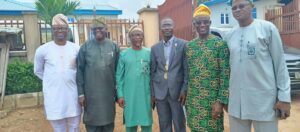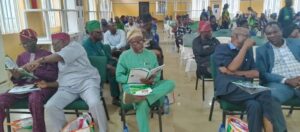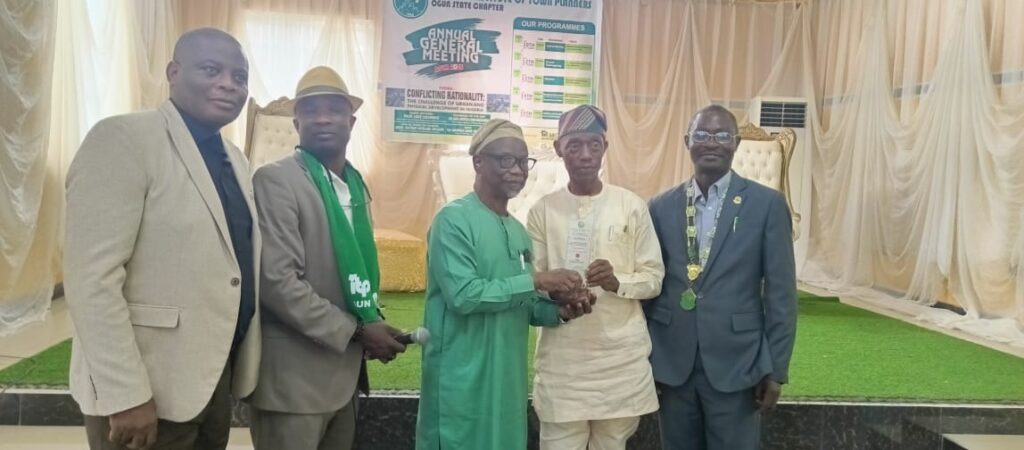…Urges State To Fund Urban Development Through Land Swap
Daud Olatunji
A renowned urban planner and former Head of the Department of Urban and Regional Planning, University of Lagos, Prof. Leke Odunwaye, has warned that Ogun State stands the risk of chaotic and uncoordinated development if it fails to implement comprehensive settlement planning.
Speaking with journalists after delivering a lecture at the Annual General Meeting of the Nigerian Institute of Town Planners (NITP), Ogun State chapter, Prof. Odunwaye said the state’s rapid growth demands urgent and structured planning to prevent future urban crises.
According to him, “Ogun State is developing very fast and if we don’t plan our settlements, we might be losing a lot. It doesn’t really cost much to plan. The government can simply include at least one town per senatorial district in its annual budget for master plan development.”
The former Dean, Faculty of Environmental Science, UNILAG , who described town planners as “prophets of development,” explained that the essence of urban planning is to foresee and structure settlements before uncontrolled growth takes over.
“Planners are like prophets. They project how settlements should look because they have the knowledge, the theory and the legislation that guides development,” he said.
Odunwaye warned that many towns in Ogun are becoming economically unviable due to poor spatial coordination.
He cited Sagamu as an example of a town whose agricultural lands are being encroached upon by industrial activities.
“Sagamu is looking vibrant now because of developments along the expressway, but its agricultural land is fast disappearing. Agriculture supports urban life, and when you lose it, the town’s sustainability is threatened,” he cautioned.
To address the problem, Odunwaye proposed that the state government embark on systematic master plan projects annually, suggesting a financing model that leverages land assets.
“Let’s assume a plan costs N400 million to prepare; the state can use land to pay consultants. Once a plan is drawn, the value of land increases automatically. Developers prefer to invest in areas with clear, documented development plans,” he said.
He added that investors, especially from Europe and America, look out for existing plans before committing funds.
“Before they arrive, they want to know the industrial zones, how they connect to the airport, highways, and railways. Without a plan, we lose credibility,” he said.
Odunwaye also called for greater adoption of technology in monitoring urban growth, noting that modern planning no longer requires constant field inspections.
“With the right equipment, planning officers can track developments from their offices. Technology should complement physical monitoring,” he added.
Delivering his paper titled “Conflicting Rationality: The Challenge of Urban and Physical Development in Nigeria,” Odunwaye emphasized the need to tackle corruption and administrative bottlenecks within planning institutions.
He recommended a “one-desk system” in planning offices to simplify procedures, along with “empowerment of existing agencies, public enlightenment, land swaps to fund consultancy, and development of bankable urban master plans.”
Odunwaye concluded that with consistent planning, Ogun State could transform within two decades.
“If we start now and do three master plans yearly, in 20 years Ogun State will be a different story — more orderly, efficient and sustainable,” he said.
The Chairman of NITP, Ogun State chapter, Tpl. Adefela Sogbesan, also urged the public to change their perception of town planners as agents of demolition.

“People think planners only demolish buildings. That’s not who we are. With professional advice, there will be no need for demolition because buildings won’t be erected where they shouldn’t be,” he said.
Sogbesan added that the AGM’s theme was chosen to address the conflicts between colonial planning methods and Nigeria’s indigenous settlement systems.
“The methods of our colonial masters differ from ours, but we adopted theirs, creating conflicts. That’s why this conversation is important,” he explained.
Also speaking, Hon. Moruf Afuape a member of the House of Representatives, representing Abeokuta South, emphasized the importance of planning ahead, describing it as “the only way to secure sustainable national development.”
The Ogun State Commissioner for Physical Planning and Urban Development, represented by Mr. John Olutunde, commended the town planners for their dedication and assured them of government’s support, noting that the state is reviewing its urban laws to align with modern realities.

Do you want to share a story with us? Do you want to advertise with us? Do you need publicity for a product, service, or event? Contact us on WhatsApp +2348183319097 Email: platformtimes@gmail.com
We are committed to impactful investigative journalism for human interest and social justice. Your donation will help us tell more stories. Kindly donate any amount HERE




